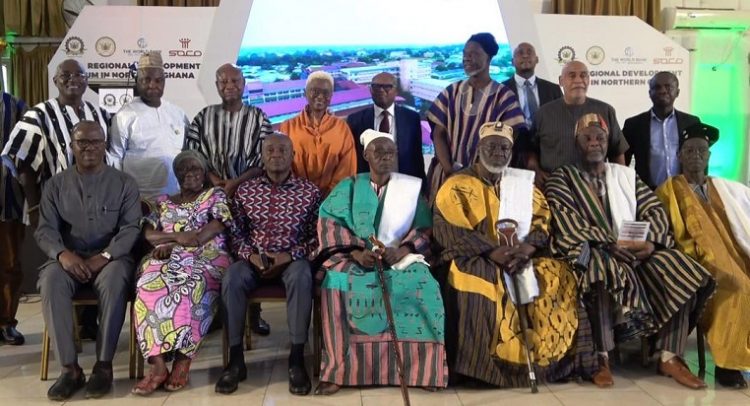The Vice Chairman of the National Development Planning Commission, David Quaye Annang with Dan Botwe with chiefs and other major stakeholders in Tamale
The National Development Planning Commission (NDPC) in collaboration with the Ministry of Local Government, Decentralisation and Rural Development, has organized the Northern Regional Development Forum in Tamale, the Northern region.
The Northern Development Forum seeks to chart a path for ensuring the even development of the Northern part of Ghana under the theme “A Policy Thrust: Achieving Equitable and Balanced Development through Effective Project Delivery in Northern Ghana”.
The forum brought together the Regional Coordinating Councils, Metropolitan, Municipal, and District Assemblies, Northern Development Authority, and other stakeholders.
The Vice Chairman of the NDPC,
David Quaye Annang, disclosed that the forum serves as a platform for conversations to evolve into actions and for partnerships that will pave the way for local development leveraging on the Gulf of Guinea Social Cohesion (SoCo) Project and other public-private efforts.
According to him, the NDPC has in the past-organized National Development Forums of this nature to discuss issues that have a nationalist focus.
“ We decided to organize regional forums to transfer the power to the regions to have a more detailed conversation about their unique challenges and opportunities, and out of these, evolve localised solutions and strategies to address them. The Northern Regional Forum is the first in the series of these forums and offers us a great opportunity to initiate a bigger conversation and set the pace for the other regions to emulate.”
“We stand on the brink of change, mindful of the historical challenges that Northern Ghana has faced. Imbalances in development, favouring the South, have perpetuated disparities. These disparities echo across sectors, magnifying the differences between rural and urban areas, subnational regions, and the prevalence of poverty. These challenges are exacerbated by the unique conditions of the Guinea Savannah ecological zone. Driven by erratic rainfall and prolonged droughts, the impact reverberates through livelihoods and resources, affecting communities. Amidst these trials, we find beacons of hope in successful projects that exemplify the transformative power of collaboration.”
The Minister for Local Government, Decentralisation, and Rural Development, Daniel Kweku Botwe, indicated that the forum provides an opportunity to assess progress and perspectives on how to ensure rapid socio-economic development in a well-coordinated, harmonised, and sustainable manner.
He revealed that the Ministry together with the World Bank held an engagement with Development Partners to deliberate on specific areas of collaboration and synergies using the $150 Million Credit Facility of the Gulf of Guinea Northern Regions Social Cohesion (SOCO) Project as a catalyst.
“The expected outcome of that engagement was to identify and pursue areas of synergy defined in a roadmap for joint action towards a coordinated and integrated development in the northern part of Ghana. For this to be achieved, all stakeholders must be engaged at every stage; share lessons and best practices, and discuss areas of collaboration. I see this Forum as an opportunity to further the discussions that we started in May, geared towards deepening the conversation towards an impact-oriented development.”
The Minister for Local Government said the Gulf of Guinea Northern Regions Social Cohesion (SOCO) Project is being implemented under the Ministry in forty-eight (48) Metropolitan, Municipal, and District Assemblies (MMDAs) across the Upper West, Upper East, Northern, Savannah, North-East and Oti Regions, is a Game Changer.
“The SOCO Project makes it a priority to strengthen local institutions and enhance the voices, influence, and ability of vulnerable people (including youths) to act and play a role in prioritising local development investments and promoting social cohesion and trust in their communities.”
Mr. Botwe noted that the northern part of Ghana is exposed to severe climatic conditions which have affected the livelihoods of people, mostly in the areas of agriculture, and that the exposure of these communities to extreme weather events such as flooding and drought leading to the destruction of farmlands, food crops, and livestock and in some cases lives and property.
He is optimistic that the forum will present an opportunity for stakeholders to explore an integrated development approach towards the delivery of development programmes and projects in the northern part of Ghana to consolidate the efforts by the government and other stakeholders geared towards making a greater impact.
“I hope that all of us here as major stakeholders will put shoulders to the wheel to achieve this common goal and objectives which will culminate in the equitable, balanced, and sustainable development of our communities in consonance with SDGs.”
BY Eric Kombat, Tamale


